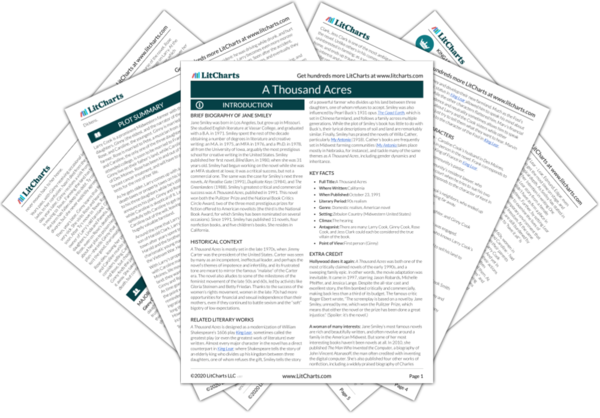It’s no secret that A Thousand Acres is based on William Shakespeare’s famous tragedy King Lear. Where Shakespeare’s work is about an elderly king who tries to divide up his property between his three daughters, Regan, Goneril, and Cordelia, Smiley’s novel is about an elderly farmer, Larry Cook, who tries to divide up his property between his three daughters, Rose, Ginny, and Caroline. There are long passages in A Thousand Acres that are intended as homages to famous speeches from King Lear, and many of the secondary and even smaller characters have direct counterparts in Lear. It’s certainly important to keep the parallels between Smiley’s novel and Shakespeare’s play in mind while reading A Thousand Acres. But Smiley’s goal isn’t just to re-tell King Lear in a modern setting. Rather, she uses the original play as a source that she then plays with and revises, offering her own interpretation and critique of Shakespeare’s themes.
Lear, as its title suggests, puts the king at its center and explores its story around that central focus. A Thousand Acres, with a title that focuses on the land being divided rather than on any one character, takes a broader view, and in particular spends more time on the daughters’ side of the story: Ginny (the counterpart to Goneril, who in Lear is power-hungry and greedy above all else) is the narrator of the novel. By focusing on Ginny’s perspective, the novel presents her with real complexity. It isn’t that she’s presented as purely virtuous or good in the novel – she’s at times power-hungry, greedy, and vengeful, to name a few traits – but the novel does present her choices and actions within a broader context, and in doing so shows how so-called “evil” women might themselves be the victims of societal evils like sexism and abuse.
More broadly speaking, Smiley retells Lear in such a way that the characters in Lear who seemed more overtly evil (such as Edmund, Goneril, and Regan) are now presented as neither entirely sympathetic nor completely evil (Ginny, Jess Clark, Rose). Ginny initially seems to be a decent, moral person, and believes herself to be a decent person even after her actions grow increasingly greedy and cruel, making it more difficult for readers to condemn or condone these actions. Even a character like Larry Cook, who’s guilty of an unambiguously evil crime, rape, may himself be the victim of other people’s evil deeds later in life. In general, A Thousand Acres uses its Lear allusions to suggest that labels like “good” and “evil” often can’t be so firmly applied in the real world.
King Lear and Good vs. Evil ThemeTracker

King Lear and Good vs. Evil Quotes in A Thousand Acres
I have this recurring nightmare about grabbing things that might hurt me, like that straight razor Daddy used to have, or a jar of some poison that spills on my hands. I know I shouldn’t and I watch myself, but I can’t resist.
“He is crazy,” said Rose. Anyway, Ginny, you’re running out of money
and you have all the expensive rentals left before you get to Go.”
After you’ve confided long enough in someone, he or she assumes the antagonism you might have just been trying out. It was better for now to keep this conversation to myself.
I flattered you when I called you a bitch! What do you want to reduce me to? I’ll stop this building! I’ll get the land back! I’ll throw you whores off this place. You’ll learn what it means to treat your father like this. I curse you!
It was incredible to hear Rose speak like this, but it was intoxicating, too, as sweet and forbidden as anything I had ever done.
One of the jars of sausage was close to the edge of the table. I pushed it back and looked at Jess again. For the first time in weeks what was unbearable felt bearable.
“Look at Daddy! He knew he’d treated me unfairly, but that we really felt love for each other. He made amends. We got really close at the end.”
…
“How did he mistreat you?”
“Well, by getting mad and cutting me out of the farm.”
I can’t say that I forgive my father, but now I can imagine what he probably chose never to remember—the goad of an unthinkable urge, pricking him, pressing him wrapping him in an impenetrable fog of self that must have seemed, when he wandered around the house late at night after working and drinking, like the very darkness. This is the gleaming obsidian shaft I safeguard above all the others.











